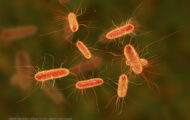The FDA has released advice for consumers about the risks of feeding raw diets to their pets. Not only can your pets become ill, but you can too, either through contact with contaminated food or if your pet sheds pathogenic bacteria. Salmonella and Listeria monocytogenes are two bacteria found in raw diets that are especially dangerous to pets and humans.
 Raw pet food is meat, bones, and organs that have not been cooked. FDA does not believe feeding raw pet foods to animals is “consistent with the goal of protecting the public from significant health risks.” The agency recommends cooking raw meat and poultry to kill pathogenic bacteria before you give the food to your pets.
Raw pet food is meat, bones, and organs that have not been cooked. FDA does not believe feeding raw pet foods to animals is “consistent with the goal of protecting the public from significant health risks.” The agency recommends cooking raw meat and poultry to kill pathogenic bacteria before you give the food to your pets.
One of the problems with a raw food diet is that people think it’s natural for animals to eat raw meat. Feral cats and dogs catch prey and eat it raw, but as Dr. William J. Burkholder, Veterinary Medical Officer in the FDA’s Division of Animal Feeds says, “that’s true. But we don’t know how many of these animals get sick or die as a result of doing that. Since sick feral animals are rarely taken to a veterinarian when they are ill, there’s no way to collect that information.”
Salmonella is commonly found in raw or undercooked meat, poultry, eggs, and egg products. This bacteria can also contaminate unpasteurized milk and dairy products, and raw fruits and vegetables. Symptoms of a Salmonella infection include vomiting, diarrhea that may be bloody, fever, loss of appetite, and decreased activity.
Listeria bacteria is commonly found in uncooked meats, vegetables, unpasteurized milk, and soft cheeses. Listeria grows at refrigerator temperatures, which means they will not only grow in the food, but will contaminate other food in the fridge. Symptoms of listeriosis in animals include nausea, diarrhea, and fever.
Burkholder concluded, “feeding raw foods to pets increases the risk that both the pet and the people around the pet will encounter bacteria that cause foodborne illness, particularly if the products are not carefully handled and fed. This is certainly one factor that should be considered when selecting diets for your pet.”




